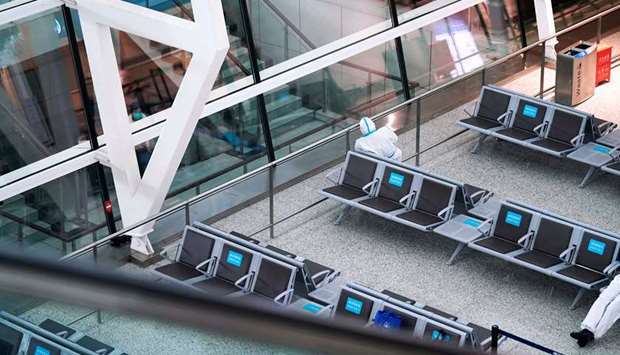More than 101,000 people around the world have died in the new coronavirus pandemic, according to a tally from Johns Hopkins University.
There are more than 1.6mn confirmed cases, though the true number of infections is likely higher, in part owing to testing shortages.
Similarly, the death toll from Covid-19, the respiratory disease related to the virus, might be greater.
Italy has more than 18,000 deaths, followed by the US where nearly 17,000 people have lost their lives, while Spain has nearly 16,000 fatalities, and France's toll has passed 13,000.
Britain is set to hit 9,000 deaths.
In the US, which has the highest number of cases in the world, with more than 473,000 confirmed infections, New York State remains the hardest hit region, with at least 7,844 confirmed deaths.
Signs are emerging in hotspots like northern Italy and areas of the US, including New York and Louisiana, that mitigation efforts are working.
New York saw a decline in hospitalisations and the number of people in intensive care has dropped.
However, because of the lag between the time of infection and patients succumbing to the illness, the death toll is still rising quite sharply.
However, officials are warning that lifting restrictions- such as stay-at-home orders - too soon could lead to a resurgent wave of infections.
US President Donald Trump has pledged to listen to experts regarding their advice on how to reopen, even as he clearly wants to restart the economy sooner rather than later, with 16mn people having lost their jobs so far.
This week, Chinese authorities lifted a 76-day lockdown in Wuhan, the city where the new coronavirus was first detected at the end of 2019.
Some restrictions remain in place, but the move was seen as a positive sigh.
At the same time, there are still emerging spreads in various locations around the world, including in Asia.
The grim milestone came as the World Health Organizsation issued a dire warning that prematurely lifting lockdown restrictions — which have kept more than half the world's population in lockdown — could spark a "deadly resurgence" of the disease.
"I know that some countries are already planning the transition out of stay-at-home restrictions. WHO wants to see restrictions lifted as much as anyone," WHO chief Tedros Adhanom Ghebreyesus said.
"At the same time, lifting restrictions too quickly could lead to a deadly resurgence. The way down can be as dangerous as the way up if not managed properly."
The extraordinary measures from New York to New Delhi to Naples have seen businesses and schools closed in a desperate bid to halt the virus's relentless spread and the International Monetary Fund said the world now faces the worst downturn since the Great Depression of the 1930s.
More than 4bn people are confined to their homes across swathes of the globe as governments imposed never-before-seen measures to halt the virus's deadly global march.
Similarly, the death toll from Covid-19, the respiratory disease related to the virus, might be greater.
Italy has more than 18,000 deaths, followed by the US where nearly 17,000 people have lost their lives, while Spain has nearly 16,000 fatalities, and France's toll has passed 13,000.
Britain is set to hit 9,000 deaths.
In the US, which has the highest number of cases in the world, with more than 473,000 confirmed infections, New York State remains the hardest hit region, with at least 7,844 confirmed deaths.
Signs are emerging in hotspots like northern Italy and areas of the US, including New York and Louisiana, that mitigation efforts are working.
New York saw a decline in hospitalisations and the number of people in intensive care has dropped.
However, because of the lag between the time of infection and patients succumbing to the illness, the death toll is still rising quite sharply.
However, officials are warning that lifting restrictions- such as stay-at-home orders - too soon could lead to a resurgent wave of infections.
US President Donald Trump has pledged to listen to experts regarding their advice on how to reopen, even as he clearly wants to restart the economy sooner rather than later, with 16mn people having lost their jobs so far.
This week, Chinese authorities lifted a 76-day lockdown in Wuhan, the city where the new coronavirus was first detected at the end of 2019.
Some restrictions remain in place, but the move was seen as a positive sigh.
At the same time, there are still emerging spreads in various locations around the world, including in Asia.
The grim milestone came as the World Health Organizsation issued a dire warning that prematurely lifting lockdown restrictions — which have kept more than half the world's population in lockdown — could spark a "deadly resurgence" of the disease.
"I know that some countries are already planning the transition out of stay-at-home restrictions. WHO wants to see restrictions lifted as much as anyone," WHO chief Tedros Adhanom Ghebreyesus said.
"At the same time, lifting restrictions too quickly could lead to a deadly resurgence. The way down can be as dangerous as the way up if not managed properly."
The extraordinary measures from New York to New Delhi to Naples have seen businesses and schools closed in a desperate bid to halt the virus's relentless spread and the International Monetary Fund said the world now faces the worst downturn since the Great Depression of the 1930s.
More than 4bn people are confined to their homes across swathes of the globe as governments imposed never-before-seen measures to halt the virus's deadly global march.



